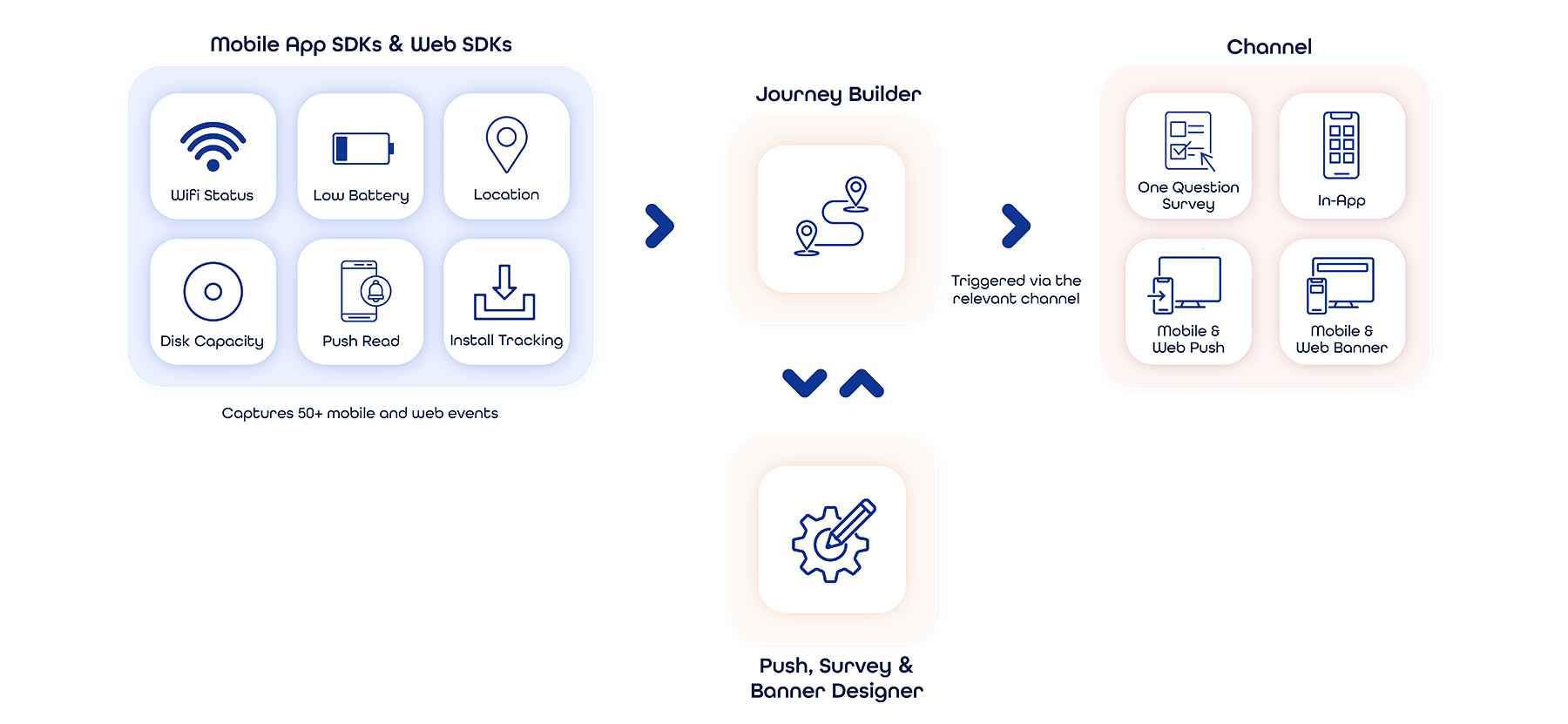- The Evolution of Mobile App Personalization
- How AI Enhances Mobile App Personalization
- 1. Behavioral Analysis
- 2. Real-Time Personalization
- 3. Natural Language Processing (NLP)
- 4. Smart Segmentation
- 5. Continuous Learning and Optimization
- The Benefits of AI-Powered Mobile App Personalization
- 1. Increased User Engagement
- 2. Higher Conversion Rates
- 3. Improved Customer Retention
- 4. Efficient Resource Allocation
- The Challenges in Implementing AI-Driven Mobile App Personalization
- 1. Data Quality and Integration
- 2. Privacy Concerns and Regulations
- 3. Algorithm Bias
- 4. Resource Requirement
- evamX: Revolutionizing Mobile App Personalization with AI
- 1. Unified Data Integration
- 2. Privacy-First Personalization
- 3. Bias-Free AI Models
- 4. Scalable AI Solutions
- 5. Enhanced Engagement and Retention
In today’s digital world, mobile apps have become a crucial part of how brands connect with their customers. With millions of apps available on the market, offering personalized app experiences is essential to stand out and foster customer loyalty. As consumer expectations rise, traditional approaches to personalization are no longer enough.
Enter AI-driven mobile marketing, where artificial intelligence (AI) transforms the way brands interact with users. From personalized recommendations to dynamic content, AI empowers mobile apps to adapt to user behavior, making every experience feel custom-tailored and seamless.
In this post, we’ll explore how artificial intelligence in mobile apps is revolutionizing the way brands personalize their offerings. By harnessing the power of AI, businesses can drive mobile app engagement, improve user retention, and boost conversions through data-driven mobile marketing.

The Evolution of Mobile App Personalization
Personalization has always been a goal for mobile app developers, but achieving it on a meaningful scale has been challenging. Early mobile app personalization was limited to basic features like language settings or location-based recommendations, which provided users with some level of customization. However, these rule-based systems were static and couldn’t truly adapt to the nuances of individual user behavior.
The real turning point came with the introduction of artificial intelligence. AI gave mobile apps the ability to not only analyze data but also predict what users might want next, offering more relevant content and features in real time. This shift from basic personalization to predictive, data-driven experiences allowed brands to deliver seamless, intuitive interactions that felt genuinely tailored to each user’s needs, creating a much more engaging and effective experience.
How AI Enhances Mobile App Personalization
AI has completely redefined what’s possible when it comes to mobile app personalization. By leveraging vast amounts of data, machine learning, and real-time analytics, AI helps brands deliver more relevant and individualized experiences that drive better engagement and user satisfaction. Here’s how AI makes it all happen:
1. Behavioral Analysis
AI can track and analyze a user’s behavior, such as what they search for, what they click on, how long they spend on certain pages, and their in-app purchases. This data enables AI to understand preferences and habits, allowing apps to predict future behavior and personalize the experience accordingly.
2. Real-Time Personalization
Unlike traditional methods, which rely on pre-set rules, AI offers real-time personalization. It can adjust content, offers, and even the user interface dynamically, based on a user’s current context, such as their location, time of day, or recent activity. This means users get exactly what they need when they need it, whether it’s a special promotion or content that’s perfectly aligned with their current mood or intent.
3. Natural Language Processing (NLP)
AI-powered apps are increasingly using Natural Language Processing (NLP) to understand user intent through text and voice interactions. Whether it’s a voice assistant, chatbot, or in-app search feature, sentiment analysis allows the app to respond to queries more accurately, providing a highly personalized and intuitive experience.
4. Smart Segmentation
AI doesn’t just segment users based on basic demographics anymore. It can create dynamic segments by analyzing individual behavior and preferences. This allows brands to deliver hyper-targeted content, messages, and offers to specific user groups, improving the relevance of marketing efforts and increasing conversion rates. Push notifications, in-app messages, and emails can all be personalized to an incredibly granular level.
5. Continuous Learning and Optimization
One of the greatest strengths of AI is its ability to learn and improve over time. As AI gathers more data from user interactions, it continuously refines its predictions, leading to better personalization with each interaction.
The Benefits of AI-Powered Mobile App Personalization
AI-powered mobile app personalization offers a wealth of advantages for brands looking to enhance user experiences and drive business results. Here’s how AI can help businesses boost engagement, conversions, and efficiency:
1. Increased User Engagement
When apps show relevant content, recommendations, and offers based on user preferences and behavior, users are more likely to interact with the app regularly. This increased engagement translates to more time spent in the app, higher interaction rates, and ultimately greater brand loyalty.
2. Higher Conversion Rates
AI’s ability to predict user behavior means brands can deliver highly targeted offers at the right moment, increasing the chances of conversion. Whether it’s recommending a product or sending a tailored offer, AI ensures that the content a user sees is most likely to prompt them to take action, whether that’s making a purchase, subscribing to a service, or completing a desired in-app action.
3. Improved Customer Retention
AI doesn’t just help attract new users, it also plays a key role in retaining them. By continually offering personalized content that adapts to the user’s changing preferences, AI makes sure that users feel valued and understood. This ongoing relevance and attention to individual preferences help to build stronger relationships and keep users coming back over time.
Predictive analytics further enhance this by identifying potential friction points in the user journey. By proactively addressing these pain points, whether through personalized prompts, smoother navigation, or tailored support, AI can resolve issues before they lead to churn
4. Efficient Resource Allocation
AI can automate a lot of the personalization process, allowing brands to scale their marketing efforts without sacrificing quality. Instead of manually segmenting users or tweaking campaigns, AI can do the heavy lifting, ensuring that every user receives the right message or recommendation at the right time. AI-driven mobile marketing automation results in a more efficient use of marketing resources and better ROI.
The Challenges in Implementing AI-Driven Mobile App Personalization
While AI-driven personalization offers immense benefits, it’s not without its challenges. Implementing AI in mobile apps requires careful planning, the right tools, and an ongoing commitment to refinement.
1. Data Quality and Integration
AI’s effectiveness depends on high-quality and clean data. If the data fed into the system is inaccurate, incomplete, or siloed, AI algorithms won’t be able to generate meaningful insights or deliver relevant experiences.
Additionally, many brands struggle with integrating data across different platforms and touchpoints, whether it’s from mobile apps, websites, CRM systems, or social media. Without a unified data strategy, AI can’t effectively personalize experiences at scale.
2. Privacy Concerns and Regulations
As privacy regulations like GDPR and CCPA become stricter, brands must navigate the delicate balance between personalization and user privacy. Collecting and utilizing data to power AI-driven personalization requires transparency and consent. Failing to comply with privacy laws or properly communicate data usage to users can result in penalties and loss of trust, making it essential to prioritize user consent and data protection when implementing AI.
3. Algorithm Bias
AI algorithms are only as good as the data they are trained on. If the data is biased or incomplete, the resulting recommendations can be skewed, leading to unfair or inaccurate experiences. Ensuring that AI models are trained on diverse and representative datasets and continually tested for fairness is crucial to avoiding this issue.
4. Resource Requirement
Developing and implementing AI-powered personalization strategies can be resource-intensive. It requires the right technology stack, skilled personnel, and ongoing investment in research and development. For small to medium-sized businesses, this can be a significant challenge. AI models also need to be continuously updated and optimized to ensure they stay relevant and effective, adding to the long-term cost and resource commitment.
evamX: Revolutionizing Mobile App Personalization with AI
evamX is an AI-powered, omnichannel marketing platform that leverages the power of predictive analytics, real-time behavioral analysis, and seamless data integration to provide a unified and personalized experience for users.

Here’s how evamX makes it easier to implement AI for mobile app personalization:
1. Unified Data Integration
The platform ensures that data from all channels is integrated and accurate, enabling AI to create real-time, relevant experiences without the challenges of fragmented data.
2. Privacy-First Personalization
evamX prioritizes compliance with privacy regulations, allowing businesses to offer personalized experiences while maintaining user trust and data protection.
3. Bias-Free AI Models
With continuous monitoring and optimization, the platform ensures that AI models remain fair and accurate, delivering personalized experiences without biases or inaccuracies.
4. Scalable AI Solutions
evamX offers scalable AI-powered personalization for businesses of all sizes, making it accessible for startups as well as large enterprises without overwhelming resources.
5. Enhanced Engagement and Retention
By automating the personalization process and optimizing the user journey, the platform helps improve engagement, reduce friction, and boost retention by resolving user frustrations before they become barriers.
With evamX’s AI-powered omnichannel marketing platform, businesses can elevate their mobile app personalization efforts, create seamless user experiences, and drive meaningful growth.
Contact Us or Request a Demo to explore how AI can transform mobile app marketing and deliver truly personalized experiences at scale.








